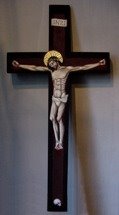Results are in on the pseudo-survey conducted by a new group aptly named "LEAC" (I'm not sure if it should be pronounced "leak" or "leach" -- or perhaps "leech") -- Lay Episcopalians for the Anglican Communion. The "survey" went to all bishops (not just those who actually had the right to consent to Gene Robinson's election, and to many who were not even present at GC 2003. Only 27% of those solicited responded. (You can read more about this extremely flawed "survey" at Thinking Anglicans.
I would suggest that this survey, flawed as it is, didn't even really produce the results the surveyors hoped for. First of all, the report refers to a "reversal" but doesn't indicate the percentage of those who changed their vote (if they had one in the first place: this was asked on the first two questions, each in two parts, on the survey form, but no result for the "B" section of each question is shown in this article.) How many of the 56% actually represent a change in voting?
More importantly, note the response to the crucial third question:
"Survey respondents split almost evenly on the third question, assessing relative loyalty to ECUSA and the Anglican Communion, with 46.25 % desiring to stay with ECUSA regardless of whether it remains in the Anglican Communion. Solidarity with the Anglican Communion would come first in such a showdown for 45% and 8.75% chose not to answer that question. This division could be a serious ECUSA political concern for the presiding bishop as he leads his church into a critical period through mid-June?s General Convention and beyond."
In short, there was no overwhelming support, even among the tiny proportion of respondents, for choosing continued participation in the "Anglican Communion" over continued participation in The Episcopal Church even if no longer part of that "fellowship." Perhaps the predominantly lay surveyors forgot that clergy take an oath as part of their ordination vows, and that oath is to "the doctrine, discipline and worship of The Episcopal Church" -- not to some ill-defined "Anglican Communion."








